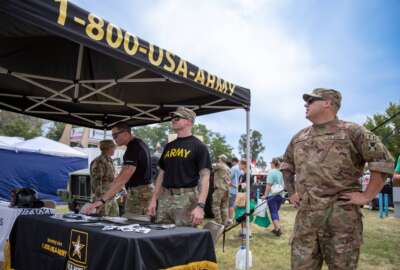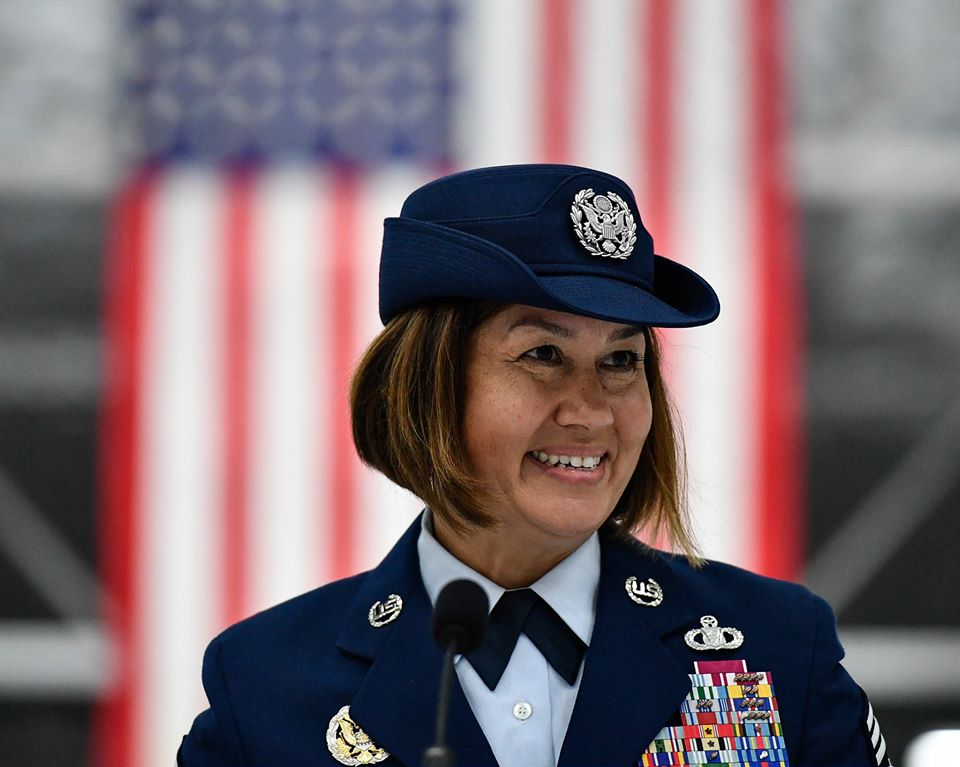While the majority of new recruits report having someone in the family who served, military families are becoming increasingly reluctant to recommend service to their loved ones.
Blue Star Families has been tracking active-duty families’ likelihood of recommending service to a young family member or someone in their network since 2016. Only 32% of families said they would recommend their sons and daughters to go into the military, down from 55% in 2016.
On the other end of the spectrum, only 15% of families said they would not recommend service to their loved ones in 2016. That number more than doubled to 31% in 2023.
“One of the major takeaways this year is that we continue to see a declining likelihood to recommend military service among our military families,” Jessica Strong, the senior director of applied research, told Federal News Network. “We know the majority of new recruits have some ties to the military. They have a parent, or a grandparent, or relative who served, so they come from families who have a tradition of military service. We know that military families are the answer to that recruiting crisis.”
More than 7,000 active-duty service members, military spouses, veterans, veteran spouses, National Guard and reserve families responded to the survey which was conducted online from May 24 to July 17.
Most survey respondents live and work at military installations across the United States, including Fort Liberty in North Carolina, Fort Cavazos in Texas and Fort Huachuca in Arizona. But they also live in communities that don’t have a military installation or large military presence. And some of them are stationed overseas at bases in Japan, South Korea, Germany and Italy, as well as embassies across the world.
Military families steer the younger generation away from service in part because of quality-of-life issues, including persistent problems with spousal employment, pay and housing. Time away from family is also one of the main factors that contribute to the growing dissatisfaction with the military service, indicating that active-duty service members and their spouses are finding it challenging to balance work and family.
“What we’re hearing is that it’s really about these quality of life issues and the balancing whether it is worth it to have a spouse who’s gone a lot and spends a lot of time away. And you have these challenges with spouse employment, and it’s challenging financially, sometimes, particularly with relocation. Is that worth it? We do see that they often recommend service because of the sense of camaraderie, the purpose and the benefits like health benefits and education benefits are great. But they’re often the challenges to families that make people question whether they should recommend service to the next generation,” said Strong.
Spouse employment has been the top issue for family respondents for the last four years. Moving dozens of times throughout a military career is challenging enough, but difficulties finding and maintaining employment for military spouses further hurt the pipeline for young recruits, as unemployed spouses are less likely to recommend service to their children.
“We’ve seen it year over year, as one of the primary challenges that military families are facing, is challenges in spouses’ being able to stay employed. We have highlighted that as a primary concern and how it impacts military families’ likelihood to stay in service or to recommend military service to the next generation,” said Strong.
Additionally, one in six family respondents report experiencing food insecurity, and the number jumps to one in four for enlisted active-duty families.
Spousal employment helps reduce household food insecurity as families struggle to make ends meet without dual income. About 37% of unemployed spouses say their families are experiencing food insecurity, compared to 11% of spouses employed at least part time.
An employed spouse, however, does not completely eliminate the experience of food insecurity.
“Our location and food prices, inflation, etc., have put us over the edge. We use food stamps and our credit cards. Our kids love and need fresh fruit and veggies, so we just buy as much as we can and go into debt because we are trying to prevent health issues for them in the future,” an active-duty Navy spouse told Blue Star Families.
Time away from family tops other concerns for National Guard and Reserve families
While National Guard and Reserve activations have decreased since the pandemic ended, family separation remains one of the primary worries for spouses.
National Guard and Reserve service members live and work in the civilian world while also fulfilling their military commitment, making it challenging for their spouses to have the support system military families living on bases or installations might have access to.
There’s also little understanding in the civilian community about what National Guard and Reserve families are going through.
“You’ll be a National Guard spouse and a friend will be like, ‘It’s okay, my spouse travels for work too.’ It’s a very different experience and often [families] talk about a lack of resources and lack of understanding for civilians [of] what the military life is,” said Strong.
Sense of belonging to the civilian community is tied to recommending service
This year’s survey found that active-duty family respondents who agree that they feel a sense of belonging to their local community report greater well-being than those who disagree, and they are also more likely to recommend military service to the younger generation.
“We learned this year that when families are relocating, they have strategies for making those new connections. But one in five say, ‘I haven’t made any new friends at my new duty station yet.’ We know that is a challenge. If we can make connections happen for military families, we can solve a lot of the other issues because belonging is so tied to families’ resilience, their well-being and even their likelihood to recommend military service,” Strong said. “Those are the things that I think are not obvious, but really critical to understand.”
Among other findings:
- In 2020, only 11% of active-duty family respondents said that access to military health care was their top concern. In 2023, it was 28%.
- Four in 10 active-duty family respondents said they waited more than two months for a specialty care appointment from the time they sought an appointment to the date of the appointment.
- More than half of respondents did not know what the basic needs allowance, or a need-based stipend, was and only 3% of respondents said that they had applied.
- 64% of active-duty spouse respondents employed full time or part time worked some portion of their hours remotely during the past year.
Copyright
© 2024 Federal News Network. All rights reserved. This website is not intended for users located within the European Economic Area.







